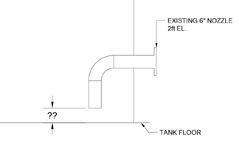Rajender1912
Mechanical
- Dec 2, 2024
- 9
Hi All,
I am designing a low suction nozzle for asphalt storage tank. The sole purpose of the nozzle is to help taking as much material out of tank as possible during emptying/cleaning of tank floors.
Outside of the tank is just a usual 6" nozzle, but inside, the idea is to install an elbow down with a pipe spool extending down as close to the tank floor as possible to take more material out. This nozzle will never be used while normal operation, only while emptying the tank.
That being said, I wanted to ask how can I determine how close to the tank floor I can safely be, to clean out as much material as possible and also not affecting the pump attached to nozzle?
Attached a quick sketch for reference.
Any guidance will be much appreciated!
I am designing a low suction nozzle for asphalt storage tank. The sole purpose of the nozzle is to help taking as much material out of tank as possible during emptying/cleaning of tank floors.
Outside of the tank is just a usual 6" nozzle, but inside, the idea is to install an elbow down with a pipe spool extending down as close to the tank floor as possible to take more material out. This nozzle will never be used while normal operation, only while emptying the tank.
That being said, I wanted to ask how can I determine how close to the tank floor I can safely be, to clean out as much material as possible and also not affecting the pump attached to nozzle?
Attached a quick sketch for reference.
Any guidance will be much appreciated!

